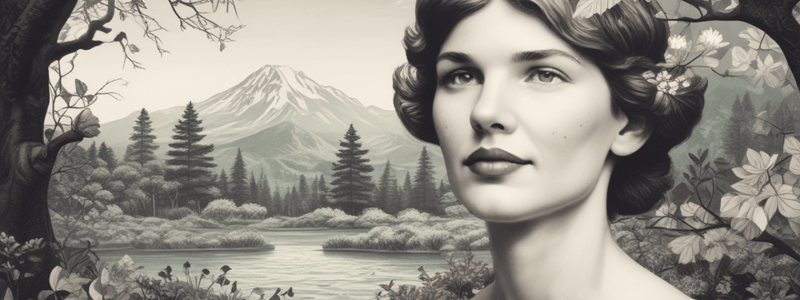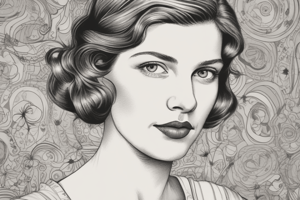Podcast
Questions and Answers
In 'Child', how does the speaker describe her child in the second stanza? What imagery does she use?
In 'Child', how does the speaker describe her child in the second stanza? What imagery does she use?
The speaker describes her child as a "little stalk without a wrinkle" using imagery of a perfect, unblemished plant.
In 'Child', what does the speaker hope her child's eyes will reflect?
In 'Child', what does the speaker hope her child's eyes will reflect?
She wants her child's eyes to reflect things that are "grand and classical."
In 'Child', what does the image of the "Ceiling without a star" symbolize in the poem?
In 'Child', what does the image of the "Ceiling without a star" symbolize in the poem?
The "Ceiling without a star" symbolizes the speaker's depression and lack of hope.
In 'Child', what is the overall effect of the juxtaposition of the child's innocence and the speaker's pain on the reader?
In 'Child', what is the overall effect of the juxtaposition of the child's innocence and the speaker's pain on the reader?
Flashcards are hidden until you start studying
Study Notes
Child by Sylvia Plath
Themes and Ideas
- The poem explores the innocence of children, the beauty of her son, love, motherhood, depression, and suicidal thoughts
- The contrast between the joy and purity of childhood and the darkness of depression
Style
- Imagery from the natural world is used to describe her son and her feelings
- Personal tone: Plath speaks directly to her son, Nicholas, creating an intimate atmosphere
- Rhyme, enjambment, and figurative language are used to convey emotions and ideas
- The poem's structure and language create a sense of detachment and contrast between light and dark themes
Analysis of Key Quotes
- "Your clear eye is the one absolutely beautiful thing" - Plath's love and admiration for her son
- "I want to fill it with color and ducks, the zoo of the new" - desire to fill her son's vision with happy, innocent things
- "April snowdrop, Indian pipe, Little Stalk without wrinkle, Pool in which images Should be grand and classical" - Plath sees her son as a perfect, growing being, and wants him to have a positive, untainted perspective
- "Not this troublous Wringing of hands, this dark Ceiling without a star" - Plath's depression and pain contrast with her son's innocence, creating a sense of despair and hopelessness
Studying That Suits You
Use AI to generate personalized quizzes and flashcards to suit your learning preferences.




